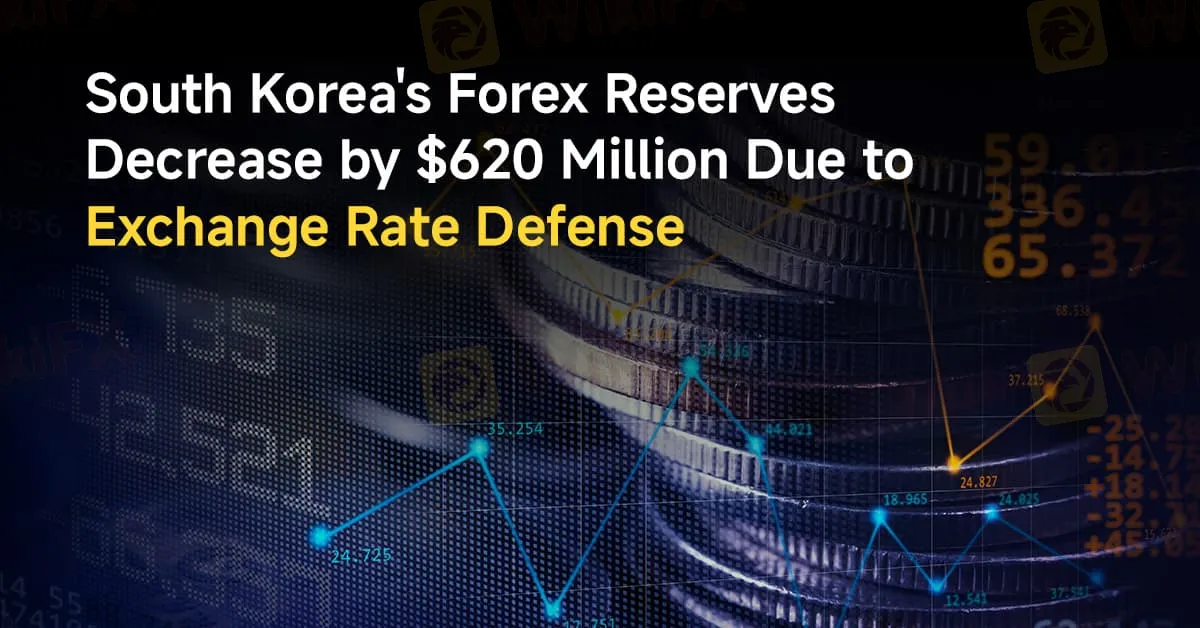简体中文
繁體中文
English
Pусский
日本語
ภาษาไทย
Tiếng Việt
Bahasa Indonesia
Español
हिन्दी
Filippiiniläinen
Français
Deutsch
Português
Türkçe
한국어
العربية
South Korea's Forex Reserves Decrease by $620 Million Due to Exchange Rate Defense
Abstract:As of the end of May, South Korea's foreign exchange reserves were ranked 9th globally, reflecting its robust position in international markets despite the recent adjustments.

As of the end of May, South Korea's foreign exchange reserves were ranked 9th globally, reflecting its robust position in international markets despite the recent adjustments.
South Korea's foreign exchange reserves experienced a decline of $620 million in June, influenced by various financial activities aimed at stabilizing currency exchange rates. According to the Bank of Korea's “End of June 2024 Foreign Exchange Reserves” report released on the 3rd of July, the country's reserves stood at $412.1 billion by the end of June, marking a decrease from the previous month.
The reduction in reserves can be attributed to several factors. Despite an increase in foreign currency deposits at financial institutions, primarily driven by the typical end-of-quarter effect, significant outflows were observed due to the repayment of foreign exchange stabilization bonds (FESBs) and foreign exchange swaps with the National Pension Service. Additionally, the appreciation of the U.S. dollar contributed to a decrease in the converted value of non-dollar foreign currency assets.
The Bank of Korea clarified, “The decrease in reserves was largely due to the maturity of FESBs and the settlement of foreign exchange swaps, coupled with the impact of a stronger U.S. dollar on the valuation of our foreign currency holdings.”
However, the central bank reassured that this decline is temporary, anticipating a reversal with the issuance of new FESBs scheduled for July. This issuance is expected to bolster reserves in the upcoming months.
The management of foreign exchange reserves plays a crucial role in South Korea's economic strategy, ensuring stability and resilience against global financial fluctuations.

Disclaimer:
The views in this article only represent the author's personal views, and do not constitute investment advice on this platform. This platform does not guarantee the accuracy, completeness and timeliness of the information in the article, and will not be liable for any loss caused by the use of or reliance on the information in the article.
Read more

OctaFX Flagged by Malaysian Authorities
OctaFX has been officially listed on warning lists by both Bank Negara Malaysia (BNM) and the Securities Commission Malaysia (SC). These alerts raise serious concerns about the broker’s status and whether it is legally allowed to operate in Malaysia.

Why Your Worst Enemy in Trading Might Be You
Be Honest With Yourself: Are You Slowly Destroying Your Trading Account?

TradingPRO: A Closer Look at Its Licences
In an industry where safety and transparency are essential, the regulatory status of online brokers has never been more important. For traders seeking to protect their capital, ensuring that a platform operates under recognised and stringent oversight can make all the difference. Keep reading to learn more about TradingPRO and its licenses.

Oil Price Breakout Incoming? Investors Should Stay Alert
Oil prices are hovering around a critical level, with potential yet to be fully unleashed. Investors must prepare for sudden changes.
WikiFX Broker
Latest News
How much money will you earn by investing in Vantage Broker?
IronFX vs Exness Review 2025: Comprehensive Broker Comparison
Fraudsters Are Targeting Interactive Brokers' Users with Lookalike Emails
Interactive Brokers: Global Office Visits and Licensing Details
Top Tips to Choose the Best Forex Broker in 2025
SEBI Notifies New F&O Rules for Investors - New Derivative Trading Limits & More Amendments
U.S. Jobs Data Released: A Potential Boost for Gold Prices
SkyLine Guide 2025 Malaysia: 100 Esteemed Judges Successfully Assembled
Everything you need to know about ADSS
Vantage Markets Review 2025: Trusted Forex and CFD Trading Since 2009
Currency Calculator


